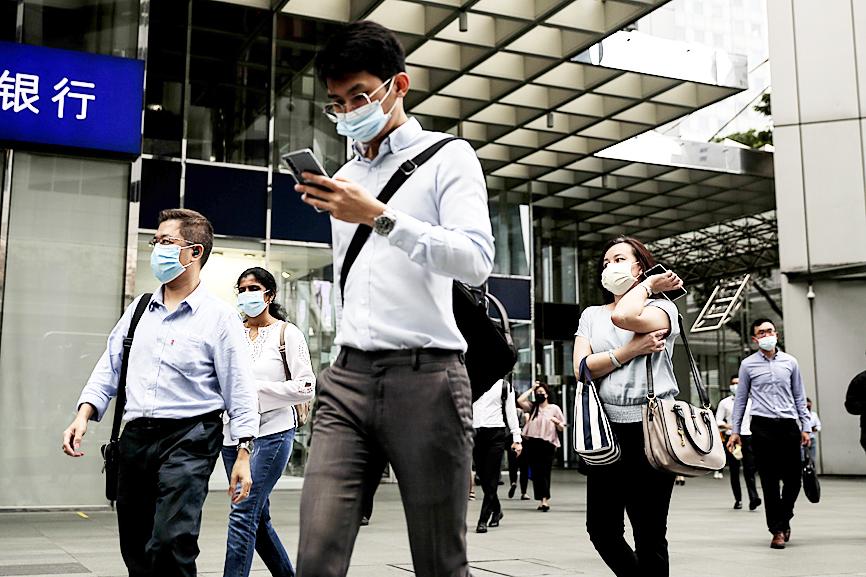Less crowded trading floors, facial recognition systems and split work areas could all become routine for bankers in Singapore as the city-state readies for office life in a post-COVID-19 world.
Financial institutions in the city-state should use more no-touch technology, allow more space for each employee and adopt split teams on trading floors once staff return after the COVID-19 pandemic, recommendations from a study commissioned by the city-state’s Monetary Authority of Singapore (MAS) and released yesterday said.
Lenders are being encouraged to use hot-desking, motion detectors, temperature and face-mask detection screening, and improved ventilation to avoid potential contamination, the report said.

Photo: EPA-EFE
Staff should be allowed to work from satellite offices or branches in addition to companies’ main headquarters, it said.
Such measures “are imperative to strike a balance between workplace safety and minimizing disruption to business operations,” said the study, which was carried out by real estate consultancy Cushman & Wakefield PLC and some of Singapore’s biggest banks.
With more than 200 financial institutions operating in Singapore, the city-state is looking at how to get staff back to the office after they have spent more than one year juggling working from home and family life.
The city-state has taken a cautious approach to returning staff to offices even as infection rates remain low.
The recommendations from Singapore envision a workplace that is geared to switch quickly to a “pandemic-on” mode so that companies can react to pandemics.
“MAS encourages our financial institutions to consider the recommended strategies in the Playbook to enhance safety and resiliency in the workplace,” MAS Deputy Managing Director Ong Chong Tee (王宗智) said in a statement. “This will be helpful to be well prepared for any situations in future that may require safe distancing and work-from-home arrangements.”
The report also compares Singapore’s approach in managing the pandemic with other major financial hubs, such as Hong Kong, Shanghai, London, New York and Sydney.
It found that the density of its offices is comparable to Sydney, with an average 7.4m2 to 11m2 per seat. That is more spacious than in Hong Kong, where it is 3.7m2 to 9m2.
How financial institutions adapt to a post-COVID-19 world has the potential to reshape business districts in hubs around the world.

South Korea’s equity benchmark yesterday crossed a new milestone just a month after surpassing the once-unthinkable 5,000 mark as surging global memory demand powers the country’s biggest chipmakers. The KOSPI advanced as much as 2.6 percent to a record 6,123, with Samsung Electronics Co and SK Hynix Inc each gaining more than 2 percent. With the benchmark now up 45 percent this year, South Korea’s stock market capitalization has also moved past France’s, following last month’s overtaking of Germany’s. Long overlooked by foreign funds, despite being undervalued, South Korean stocks have now emerged as clear winners in the global market. The so-called “artificial intelligence

Chinese artificial intelligence (AI) start-up DeepSeek’s (深度求索) latest AI model, set to be released as soon as next week, was trained on Nvidia Corp’s most advanced AI chip, the Blackwell, a senior official of US President Donald Trump’s administration said on Monday, in what could represent a violation of US export controls. The US believes DeepSeek will remove the technical indicators that might reveal its use of American AI chips, the official said, adding that the Blackwells are likely clustered at its data center in Inner Mongolia, an autonomous region of China. The person declined to say how the US government received

‘SEISMIC SHIFT’: The researcher forecast there would be about 1.1 billion mobile shipments this year, down from 1.26 billion the prior year and erasing years of gains The global smartphone market is expected to contract 12.9 percent this year due to the unprecedented memorychip shortage, marking “a crisis like no other,” researcher International Data Corp (IDC) said. The new forecast, a dramatic revision down from earlier estimates, gives the latest accounting of the ongoing memory crunch that is affecting every corner of the electronics industry. The demand for advanced memory to power artificial intelligence (AI) tasks has drained global supply until well into next year and jeopardizes the business model of many smartphone makers. IDC forecast about 1.1 billion mobile shipments this year, down from 1.26 billion the prior

FORTUNES REVERSED: The new 15 percent levies left countries with a 10 percent tariff worse off and stripped away the advantage of those with a 15 percent rate In a swift reversal of fortunes, countries that had been hardest hit by US President Donald Trump’s tariffs have emerged as the biggest winners from the US Supreme Court’s decision to strike down his emergency levies. China, India and Brazil are among those now seeing lower tariff rates for shipments to the US after the court ruled Trump’s use of the International Emergency Economic Powers Act to impose duties was illegal. While Trump subsequently announced plans for a 15 percent global rate, Bloomberg Economics said that would mean an average effective tariff rate of about 12 percent — the lowest since